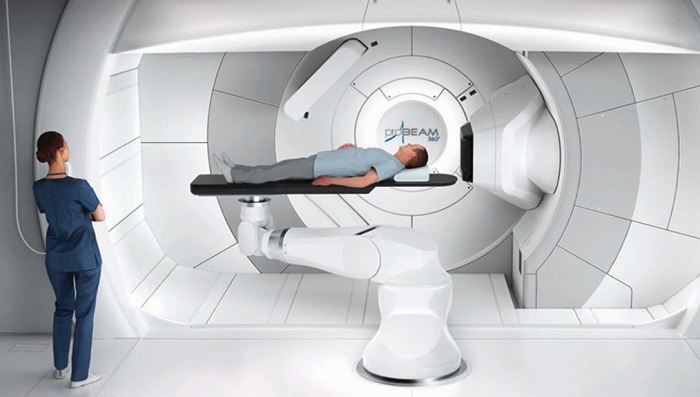Varian announced the company has received an Investigational Device Exemption (IDE) from the FDA for the first-ever clinical trial of FLASH therapy, an experimental treatment modality delivering radiation therapy at ultra-high dose rates. FLASH therapy, involving ultra-high dose rates, and delivery in typically less than one second, may be over 100 times faster compared to conventional radiation therapy. The study, named FAST-01 (FeAsibility Study of FLASH Radiotherapy for the Treatment of Symptomatic Bone Metastases), will involve the investigational use of Varian’s ProBeam® particle accelerator modified to offer this advanced non-invasive treatment option for patients with cancer.
The concept of ultra-high dose rate radiation delivery has been studied for many years. Dedicated research and development by Varian has led the advancement to the clinical study stage. Varian’s efforts include investing in bench and preclinical research and supporting the FlashForward™ Consortium, a 20-member group of institutions from around the world, which includes experts in radiation oncology, translational sciences, and medical physics.
“FLASH therapy could be one of the most significant advancements in cancer treatment in decades,” said Kolleen Kennedy, Chief Growth Officer and President of Proton Therapy Solutions at Varian. “Our progress in advancing FLASH therapy on the ProBeam platform is a testament to Varian’s investments in research that improve care for patients with cancer and the importance of our collaboration with clinicians around the world through the FlashForward Consortium.”
The FAST-01 Feasibility Study, which is expected to enroll 10 patients with bone metastases, will evaluate clinical workflow feasibility, treatment-related side effects and efficacy of treatment as assessed by measuring trial participants’ pain relief.
“Preclinical research of FLASH therapy indicates using ultra-high dose rates may be less toxic overall and enhance sparing of adjacent healthy tissue,” added Deepak “Dee” Khuntia, M.D., Senior Vice President and Chief Medical Officer of Varian. “The study is an important proof of concept, especially in deep-seated and not just superficial tumors, that adds to a growing body of data necessary to advance our understanding of how FLASH therapy works.”
About Varian
At Varian, we envision a world without fear of cancer. For more than 70 years, we have developed, built and delivered innovative cancer care technologies and solutions for our clinical partners around the globe to help them treat millions of patients each year. With an Intelligent Cancer Care approach, we are harnessing advanced technologies like artificial intelligence, machine learning and data analytics to enhance cancer treatment and expand access to care. Our 10,000 employees across 70 locations keep the patient and our clinical partners at the center of our thinking as we power new victories in cancer care. Because, for cancer patients everywhere, their fight is our fight.


















